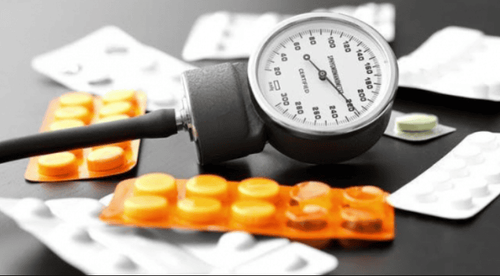This is an automatically translated article.
Diuretics are drugs often prescribed by doctors to control blood pressure or reduce edema caused by heart failure, liver failure, or kidney failure. There are many different diuretics used in medicine, one of which is the drug Methyclothiazide. So what does Methyclothiazide do?
1. What is the effect of Methyclothiazide?
What does Methyclothiazide do? It's actually a medication for high blood pressure that helps prevent complications like stroke, heart disease, and kidney problems. Methyclothiazide belongs to the group of diuretics, which increase the excretion of salt and water from the body, thereby increasing the amount of urine in the patient.
Methyclothiazide also works to reduce edema, a symptom of conditions such as congestive heart failure, liver disease and kidney disease. Methyclothiazide can eliminate excess fluid in organs such as the lungs (to help patients breathe easier), limbs and abdomen.
2. How to use Methyclothiazide?
Methyclothiazide is taken by mouth, with or without food, usually once daily or as directed by your doctor. The best condition is to take the medicine at least 4 hours before going to bed to avoid the need to urinate in the middle of the night.
The dose of Methyclothiazide is prescribed based on the patient's medical condition and response to therapy. The manufacturer recommends a maximum dose of 10mg taken once a day to treat edema or 5mg a day to treat high blood pressure.
Using Methyclothiazide regularly helps bring the most effective. In addition, should make it a habit to take the medicine at the same time every day to avoid forgetting, not increasing the dose, skipping the dose or stopping the Methyclothiazide drug unless directed by the doctor. Patients should continue to take Methyclothiazide even if there are no symptoms, because most hypertensive patients do not feel sick. It can take up to several weeks for methyclothiazide to take effect.
Cholestyramine and colestipol can reduce the body's absorption of Methyclothiazide. If you are taking these drugs, the patient should take at least 4 hours apart from methylclothiazide. Tell your doctor if your condition does not improve or if it tends to get worse (eg, more edema, increased blood pressure) even if you are taking Methyclothiazide.

Thuốc Methyclothiazide nên uống cách xa thời điểm đi ngủ để tránh đi tiểu đêm
3. Methyclothiazide side effects
Unusual signs of Methyclothiazide commonly include: dizziness, lightheadedness, headache, blurred vision, loss of appetite, stomach pain, diarrhea or constipation ... will occur when the patient's body is adapted to the drug Methyclothiazide . In addition, impaired sexual function may also occur with the use of Methyclothiazide.
The diuretic Methyclothiazide can cause the body to lose excess water and electrolytes. Quickly notify the doctor when the patient has the following signs:
A lot of dry mouth; Thirsty; Muscle spasticity; Attenuate; Fast/irregular heartbeat; Nausea, vomiting; Dizzy ; Sleepy; Faint; Confusion; Seizures. Some rare but serious side effects of Methyclothiazide:
Numbness, tingling in the limbs; Joint pain (such as big toe pain); signs of infection (such as fever, persistent sore throat); easy bruising or bleeding; Stomachache; Persistent nausea, vomiting; Unusual, persistent fatigue; Yellow eyes, skin, dark urine; signs of kidney failure (such as a change in the amount of urine); Loss of vision, eye pain.
4. Some notes when using Methyclothiazide
Before being treated with methylclothiazide, tell your doctor or pharmacist if you have a history of allergy to the drug or any other allergies.
People with certain medical conditions should not take Methyclothiazide, so before using it, consult your doctor or pharmacist if you have severe kidney problems (complete anuria). Some medical history should be noted before using Methyclothiazide:
Kidney disease, liver disease; Untreated electrolyte imbalance (eg, increase or decrease in sodium, potassium, calcium, magnesium); Severe dehydration; Gout; Lupus disease; Some recent neurosurgery (sympathectomy). For patients with diabetes, methylclothiazide may affect their blood glucose levels. Therefore, check your blood sugar as often as directed and share the results with your doctor while using Methyclothiazide. Notify your doctor immediately if you have symptoms of hyperglycemia such as increased thirst/urination.
Methyclothiazide diuretics can cause hypokalemia. Talk to your doctor about a diet with extra potassium (such as eating bananas or drinking orange juice) or using salt that contains potassium. Besides, patients can use potassium supplements prescribed by the doctor.
Methyclothiazide makes patients more sensitive to the sun. So limit time in the sun, avoid tanning or sunlamps, use sunscreen, and wear protective clothing when outdoors.
Methyclothiazide can make patients dizzy, to reduce this risk, patients should not change positions too quickly. In addition, dehydration (sweating, vomiting, or diarrhea) can lower blood pressure and worsen dizziness. Patients should drink plenty of fluids to prevent these effects and limit dehydration.
Renal function usually declines with age and Methyclothiazide is eliminated by the kidneys. Therefore, the elderly may be more sensitive to the side effects of Methyclothiazide, especially dizziness.
Methyclothiazide should be used only when clearly needed by a woman who is pregnant and needs to be discussed carefully with her doctor about the risks and benefits. Methyclothiazide passes into breast milk, although there have been no reports of harm to a nursing infant, consult your doctor before breast-feeding.

Người bị bệnh gout nên lưu ý khi uống Methyclothiazide
5. Methyclothiazide drug interactions
The medical staff (doctor or pharmacist) already knows about possible drug interactions and instructs the patient to manage them, so the patient does not arbitrarily start, stop or change the dosage of the drug. any medicine without your doctor's approval. Methyclothiazide should not be used with the following drugs because of the possibility of very serious interactions: cisapride, dofetilide.
Before taking Methyclothiazide, talk to your doctor or pharmacist about all prescription and nonprescription/herbal products you are taking, especially: diazoxide, digoxin, lithium, medications non-steroidal anti-inflammatory drugs (such as ibuprofen, indomethacin).
Some other products have ingredients that increase the patient's blood pressure, the patient should tell the pharmacist what product they are using and ask how to use them safely (especially anti-inflammatory products). coughs and colds, diet aids, or NSAIDs such as ibuprofen/naproxen).
Methyclothiazide products may affect the results of laboratory tests, so make sure the test technician and all doctors know the patient is taking Methyclothiazide. Methyclothiazide overdose symptoms may include: severe dizziness, severe weakness, fainting.
Lifestyle changes such as reducing stress, exercise, and dietary changes may increase the effectiveness of Methyclothiazide in blood pressure control. Laboratory tests or medical examinations (such as serum potassium levels, kidney and liver function tests) should be performed periodically to monitor patient progress or detect adverse events. . Check your blood pressure regularly while taking Methyclothiazide, learn how to monitor your blood pressure at home, and share the results with your doctor.
Methyclothiazide is a diuretic that is taken by prescription. Therefore, to ensure the effectiveness of treatment, patients need to take the drug according to the prescription or according to the instructions of the doctor or pharmacist.
Please dial HOTLINE for more information or register for an appointment HERE. Download MyVinmec app to make appointments faster and to manage your bookings easily.
Reference source: webmd.com













